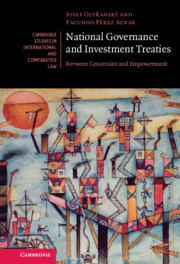Book contents
- National Governance and Investment Treaties
- Cambridge Studies in International and Comparative Law
- Reviews
- National Governance and Investment Treaties
- Copyright page
- Dedication
- Contents
- Acknowledgements
- Abbreviations
- 1 National Governance and Investment Treaties
- 2 Situating the Engagements with the Investment Treaty Regime in Argentina, the Czech Republic, India, and Mexico
- Part I Discursive and Ideological Effects of Investment Treaties on National Governance
- Part II Formal and Informal Institutional Effects of Investment Treaties on National Governance
- 5 The State’s Institutional Rearrangements and International Investment Agreements
- 6 Defending the State in ISDS and Preventing Disputes
- 7 International Investment Agreements and National Lawmaking (Part 1)
- 8 International Investment Agreements and National Lawmaking (Part 2)
- Conclusion
- Index
5 - The State’s Institutional Rearrangements and International Investment Agreements
from Part II - Formal and Informal Institutional Effects of Investment Treaties on National Governance
- National Governance and Investment Treaties
- Cambridge Studies in International and Comparative Law
- Reviews
- National Governance and Investment Treaties
- Copyright page
- Dedication
- Contents
- Acknowledgements
- Abbreviations
- 1 National Governance and Investment Treaties
- 2 Situating the Engagements with the Investment Treaty Regime in Argentina, the Czech Republic, India, and Mexico
- Part I Discursive and Ideological Effects of Investment Treaties on National Governance
- Part II Formal and Informal Institutional Effects of Investment Treaties on National Governance
- 5 The State’s Institutional Rearrangements and International Investment Agreements
- 6 Defending the State in ISDS and Preventing Disputes
- 7 International Investment Agreements and National Lawmaking (Part 1)
- 8 International Investment Agreements and National Lawmaking (Part 2)
- Conclusion
- Index
Summary
The chapter focuses on how IIAs have impacted relations in public administrations through institutional rearrangements. First, we analyse how the intervention of IIAs influenced relations between different state agencies at the central level. Here, we look mainly at central state agencies’ struggles over the IIA portfolio and the attendant budgetary repercussions. Second, we look at how the IIAs impact the relations between the central agencies and their counterparts at the levels of individual states, provinces, and municipalities. This part deals with the management of the support for foreign investment projects and issues connected with ISDS management and defence. We highlight the related budgetary politics as well. Regardless of the variations, one element arises from all of the studied states: the gradual side-lining of the traditional actors tasked with international diplomacy in favour of more sectoral expert actors that base their expertise on the considerations of trade, commerce, finance, and the economy. It also became evident that the practices of centralisation, executive rule, and discourses that put a premium on the economic considerations of efficiency and competition have been preferred by the centre to rein in provinces.
Keywords
- Type
- Chapter
- Information
- National Governance and Investment TreatiesBetween Constraint and Empowerment, pp. 147 - 185Publisher: Cambridge University PressPrint publication year: 2023



